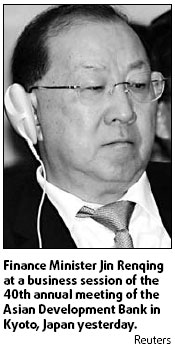Reserve to deal with currency upheavals
(Xinhua)Updated: 2007-05-07 09:06
KYOTO - The finance ministers of the Association of Southeast Asian Nations (ASEAN) as well as China, Japan and South Korea (ASEAN+3) concluded their 10th meeting on Saturday afternoon in Kyoto, vowing to deepen financial cooperation.
 |
The finance ministers unanimously agreed in principle to build up a self-managed reserve pooling arrangement governed by a single contractual agreement with a step-by-step approach to protect the fast-growing Asian economy from possible currency upheavals.
The ministers regarded the prospective arrangement as an appropriate form of multilateralization of the Chiang Mai Initiative (CMI), which now governs only bilateral currency swaps, according to a joint statement released after the meeting.
The CMI, introduced in 2000, is aimed at preventing a recurrence of the 1997-1998 Asian financial crisis. Under the initiative, central banks from participating countries are allowed to swap foreign exchange reserves to fight speculative attacks on their currencies.
The willingness to set up the reserve pooling is a tangible progress achieved after a series of negotiations over the CMI multilateralization, Finance Minister Jin Renqing said in a joint interview.
While describing the new plan as a development of regional financial cooperation, Jin mentioned that further discussions on issues such as scale, allocation, supervision, management and operational institution of the prospective reserve pooling are necessary.
"We have instructed the deputies to carry out in-depth studies on key elements, and all of us have been positive on these efforts," Jin said, adding that "a much clearer scheme" may be produced during the ASEAN+3 summit meeting later this year.
According to the statement, the ministers reiterated their commitment to maintain the two core objectives of the CMI, in specific to address short-term liquidity difficulties in the region and to supplement the existing international financial arrangements.
The ministers were pleased to see that the Bilateral Swap Arrangement (BSA) network has increased to $80 billion, consisting of 16 BSAs among eight countries, the statement said.
The 13 ministers also reiterated commitment to accelerate and deepen structural reforms and implement macro-economic policies including domestic demand-driven measures to strengthen the region's resilience and to support its sustainable economic growth in the context of the increased globalization of economies.
While being optimistic about a "broadly supportive external environment" for the regional economic expansion in coming years, the ministers warned that challenges posed by main downside risk factors, including possible spillover effects from potential slowdown in major world economies, large global imbalances, greater financial market volatilities and a recurrent rise in oil prices, are still visible.
The meeting was held on the sidelines of the four-day annual meeting of the Asian Development Bank that started on Friday.
|
||
|
||
|
|